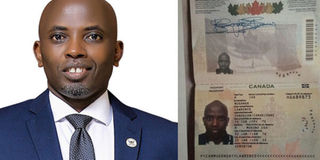Security personnel should show courtesy

Dr Lawrence Muganga, the Vice Chancellor of Victoria University was violently arrested last week. PHOTO/COURTESY
What you need to know:
- The issue: Security.
- Our view: It is necessary that members of the different security agencies respect each other lest maintenance of law and order becomes a mission impossible.
Footage of the arrest on Thursday of Victoria University Vice Chancellor, Dr Lawrence Muganga, and his unnamed assistant, Potian Kabera, by a joint security team from the Chieftaincy of Military Intelligence and the police’s Directorate of Crime Intelligence has been doing the rounds on social media.
The charges against Muganga are not known, but the spokesperson of the Uganda People’s Defence Forces (UPDF) and Ministry of Defence, Brig Flavia Byekwaso, told the media that the university don was being held on allegations of espionage.
Dr Muganga and his wife are said to hold Rwandan passports and are believed to have entered the country illegally. Dr Muganga has since been set free on bond.
We do not condone crime. If the don is in the wrong the law should take its course. No crime should go unpunished.
The question though is whether it was absolutely necessary to deploy so many gun-brandishing men to arrest, handcuff and lead Dr Muganga out of the university premises in that manner when he could have been invited to Directorate of Crime Intelligence, where he could have been detained for questioning.
The manner of arrest suggests that our security forces have never learnt that suspects are innocent until proven guilty. They also seem to have very little respect for suspects.
The situation unfortunately serves to remind us of State-inspired brutalities witnessed during the regimes of Idi Amin, Milton Obote and the Okellos. There have been fears that the country is sliding back into those horrific days. Thursday’s events will not give reassurances that it will not happen.
The worst bit was perhaps the manner in which the arresting officers roughed up Constable Barbara Nagudi, who was on duty at the university.
Ms Nagudi was in uniform, while the arresting officers were not. A uniform marks out a member of the disciplined forces as a representative of the State.
It was, therefore, incumbent upon the arresting officers to introduce themselves to her and state the nature of their business, which did not happen.
Could it be that sections of our security agencies are not knowledgeable about such protocols? Ignorance should, however, not be an excuse for the kind of disrespect and barbarism that we saw being meted out to Ms Nagudi.
It points to disrespect of Ms Nagudi simply because she is a female and disrespect of the institution of the police for which she works.
It is necessary that members of the different security agencies respect each other lest maintenance of law and order becomes a mission impossible.




